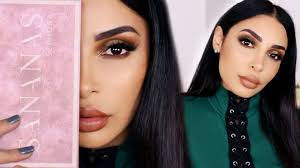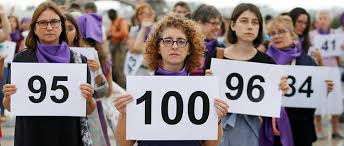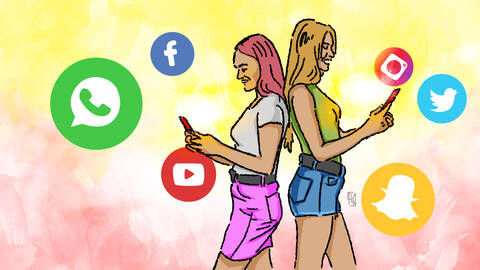Where does makeup come from and how has social media played a role in its evolution?
- Louise Lavatine

- 19 mars 2020
- 4 min de lecture
First of all, I wanted to share with you the ancestral roots of cosmetics and the history that flows from them through different eras. It was while informing myself that I saw how important make-up and hairstyle were and how truly unique over time.
According to the stories it all started during the ancient Egyptian empire. Their ideal is to have bare, smooth and clear skin, without any flaws. For them, makeup has a main function: that of beautifying, cosmetics take their place in everyday Egyptian life. The eyes are obviously highlighted, but the birth of make-up also serves to mask the wounds as well as the vagaries of time on the skin. Men, women, children, everyone wears make-up, because, in addition to its aesthetic value, make-up above all provides protection to the skin and is used by all of society to combat heat, sand, wind… The eye is surrounded by a green eyeshadow, then a black eyeshadow which protected eye diseases. The Egyptians, the first followers of makeup, combine aesthetics and a certain comfort in it.
After Ancient Egypt, there was no real improvement. For most of the eras known as for example: Ancient Greece where the makeup was perceived as in bad taste, the women who wore it were considered as courtesans or even the Middle Ages, a civilization dominated by religion. The woman should not draw the eye to her and should remain natural to be a good person.
It was in the 1910s that a real leap forward was created with TL Williams, the first mascara. Maurice Levy creates the first powder blushes and the first lipsticks. A basic trend that was only accessible to screen stars and which will become accessible to everyone from the 1920s. Several trends paraded as in 1930 with the fashion of fine eyebrows or in 1960 with the fashion eyeliner.
It was in the 1990s that the internet became accessible to all, a certain technical progress but also an unexplored domain of the general public.
It was on December 17, 1997 that Jorn Barger first used the term weblog (a contraction of the words "web" and "log") in his online journal Robot Widsom. The word "blog" then became a contraction of weblog, which can be translated as "online journal" or "logbook on the Internet". Thanks to this new population of Internet users, blogs have been able to reach both content creators and readers. In addition, blogs have developed thanks to hyperlinks, which encourage the reader of a blog to discover and read other blogs. These rebounds from blog to blog have thus contributed to their exponential expansion. Thus, 76% of publications relating to the world of cosmetics come from forums. A satisfied Internet user is then indirectly transformed into an ambassador, which constitutes a real opportunity for brands. In addition to consulting specialized forums and blogs, Internet users are also interested in specialized review platforms, including the well-known https://www.beaute-test.com, which collects several hundred reviews every day. Internet users on the latest cosmetic products distributed by brands. Consumers therefore have direct access to sincere opinions not motivated by the desire to sell. The internet user trusts the internet and the opinions it finds there. Purchases that are made exclusively through blogs and different networks. The Internet then manages its consumption.
The ease of exchange and belonging to a community is reassuring. Thus, the boom in youtubers took place in 2010.
In France, the most famous is EnjoyPhoenix, it is the first French to enter the world of youtube, inspired by American youtubers. A new concept, which allows consumers to identify with a "real" person who speaks to them and advises them on the application of the product, what to buy and current trends. Nowadays, several influencers stand out in France such as Sananas, Horia or EmmyMakeUp. Large brands want to collaborate with them because they have a community and make more views than many magazines.
Influencers are movement launchers, we can see it with Kim Kardashian in 2014. She posted a selfie on Instagram that has gone viral, showing how she does her makeup.."Contouring", today everyone knows this way of making up and all make-up brands sell their own palette so that they can do it. Beyond influencing the way we make up, they influence the criteria of beauty and the market offer.
Indeed, the Kardashians are at the head of the networks with millions of followers on their respective accounts. Young people follow them because they identify with them and want to be like them. A current trend dictated by Instagram with the fashion for thick and square eyebrows, luscious mouths well designed and a perfect complexion thanks to multiple methods. We can see a certain standardization being created on the different platforms and the influencers who share the trends. We get the impression that everyone is the same. Would social networks bring us to the end of our uniqueness?
To answer the given problem, following the examples seen previously. Yes, social networks have an impact on makeup. On what we buy but also and especially on how we apply it and the makeup we choose to do. Regardless of our will, the internet directs us to certain choices. Is it even possible to envisage an evolution of make-up without internet for the moment?
Louise Lavatine





Interesting article. Make sure you cite sources.